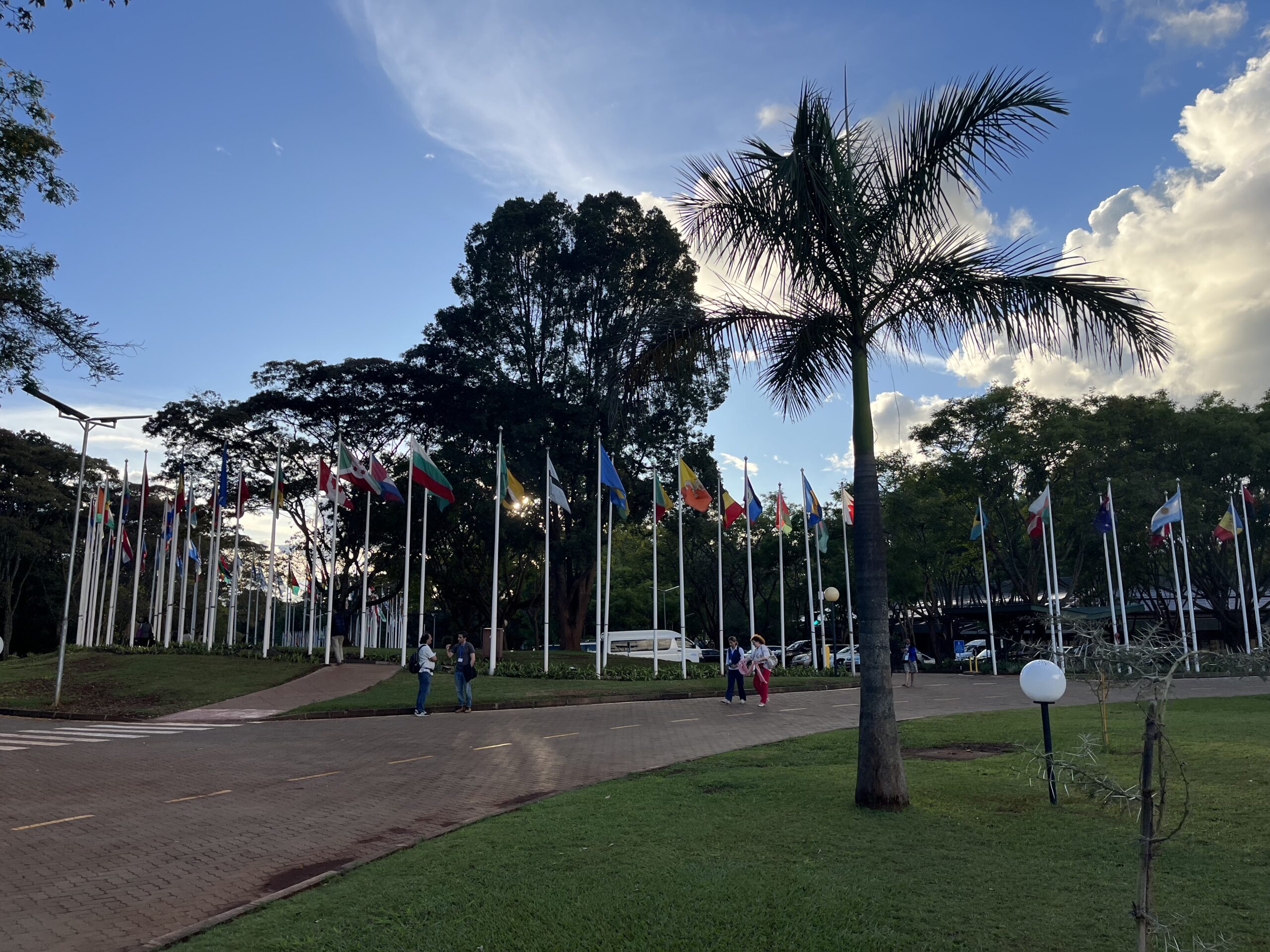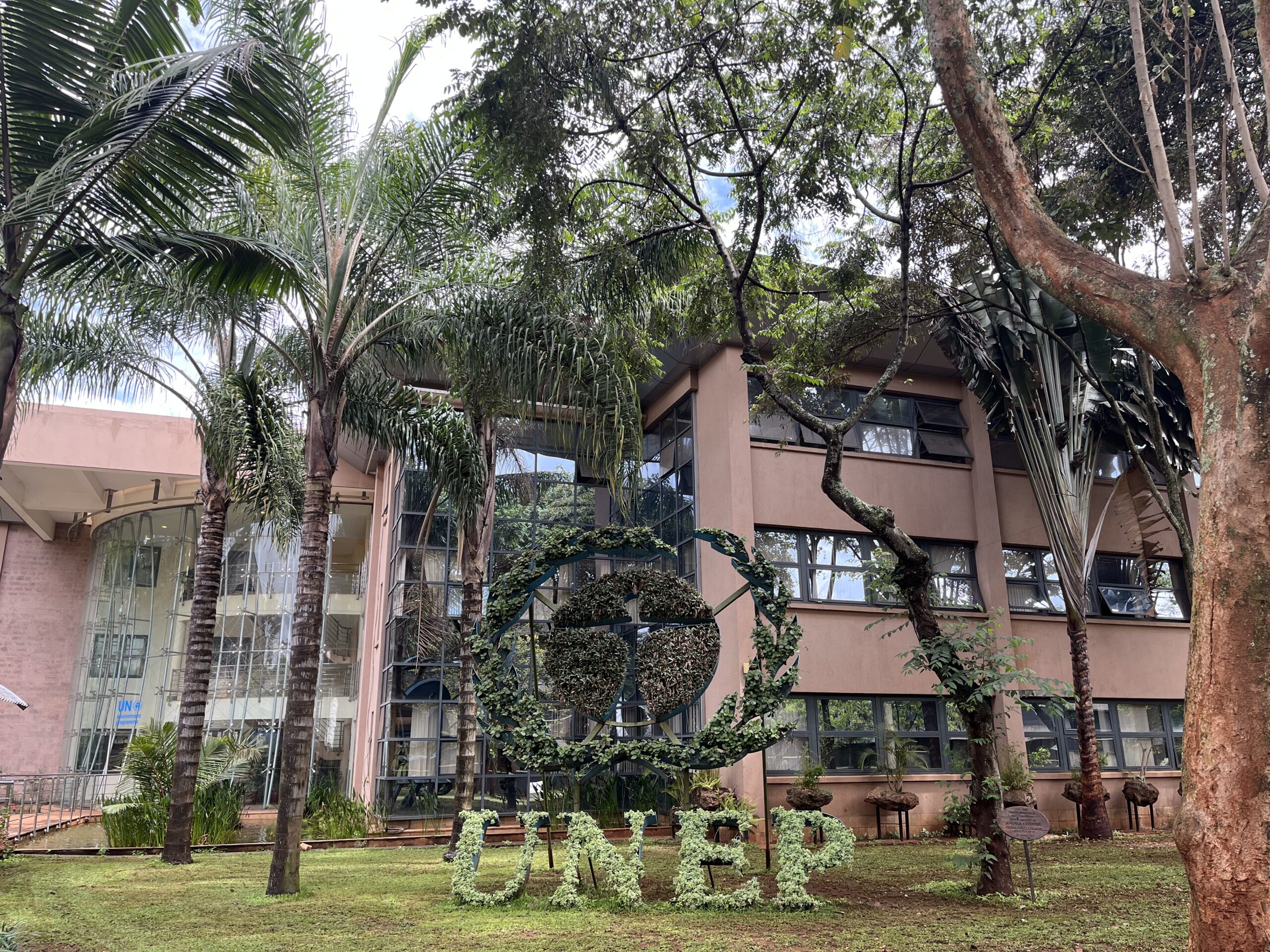Developments and challenges towards a global plastics treaty – An update from the third negotiation session in Nairobi
The third session of the Intergovernmental Negotiating Committee on Plastic Pollution (INC-3) took place in Nairobi, Kenya, and IKHAPP members were on the ground to observe developments towards a global plastics treaty. This article summarizes key developments and challenges from the treaty process.

Flags are raised at the United Nations Environment Programme (UNEP) headquarters in Nairobi, Kenya, to welcome delegates and observer to the Intergovernmental Negotiating Committee on Plastic Pollution (INC-3). (Photo: Sara Plassnig)
From 13 to 19 November, delegates from 163 countries met at the headquarters of the United Nations Environment Programme (UNEP) in Nairobi, Kenya, to continue their negotiations for an international legally binding instrument on plastic pollution. The meeting was the third of five negotiation sessions, and the first session having the so called Zero Draft of the instrument as starting point. The Zero Draft of the treaty was prepared by the INC Chair with the support of the secretariat. The objectives of the negotiations were to discuss so called main elements (related to eliminating, minimising, and regulating pollution across the plastic lifecycle) as the basis for developing the treaty text further and to agree on intersessional work – preparations that need to be coordinated prior to the fourth session of the Intergovernmental Negotiating Committee on Plastic Pollution (INC-4) that will take place in April 2024 in Ottawa, Canada. While there was an agreement to proceed negotiations with the updated Zero Draft text, no agreement was reached on intersessional work. This article explores some of the developments and challenges related to these outcomes.
Ambitious parties rally for strong plastics treaty
Ambitious countries and actors were in a majority at the third session of the Intergovernmental Negotiating Committee on Plastic Pollution (INC-3). They rallied around the goal of an international, holistic, just and binding treaty. In particular, the African Bloc and Small Island Developing States made strong interventions stressing the need for a treaty that regulates the entire life of plastic. The High Ambition Coalition (HAC) consisting of 63 likeminded countries also favours a strong plastics treaty. In addition, many of the 318 observer organisations on the ground represented civil society, that is, NGOs, indigenous groups, waste pickers organizations, groups of scientists and youth who highlighted the necessity of an ambitious negotiation process. Many of these actors advocated to phase out hazardous plastic chemicals, polymers and plastic . In order to achieve and manage such a process, it was suggested to develop a framework that identifies harmful substances as well as prohibit trade of harmful substances and products, including to and from countries outside the treaty, whilst ensuring a just transition. This framework would need to be updated regularly based on newest science. The strong support for an ambitious treaty by several influential member states and the acceptance of the Zero Draft by all parties are steps into the right direction and marks the first time that the negotiations work with an actual treaty text.

The United Nations Environment Programme (UNEP) headquarters in Nairobi, Kenya, provides a lot of open and green space for visitors to explore. (Photo: Sara Plassnig)
Hindrances to a rapid negotiation process
However, many parties also voiced concerns over unfolding developments that did not match the “high ambition” positions. As member states presented their preferred options for the treaty text, an extensive Zero Draft will form the basis for the coming negotiations at INC-4. The length and complexity of the text might add difficulty for member states to reach consensus. Disappointment among some parties also emerged in relation to the lack of a clear way forward for work. There is a that this will slow down the progress towards an international and legally binding instrument.
Some member states raised concerns at several stages that their inputs weren’t considered, while stressing that the treaty should focus on downstream measures, such as recycling. They were advocating for less stringent options that allow countries to define their own goals in plastic use reduction, circularity targets and so forth. These positions emerged already during INC-2 in Paris and did not offer new perspectives.
Other hindrances
Among the strategies that hampered the development of a high ambitious treaty, a range of tactics were adopted by different parties. These included, among others, the manufacturing of doubts or the presentation of partial evidence that lacks scientific basis. Independent scientists who were present at INC-3, such as the Scientists’ Coalition for an Effective Plastics Treaty, observed these as a growing concern while highlighting the importance of best available and independent scientific knowledge to inform the process.
Way forward
The participation and impact of stakeholders who were earlier not significantly represented in the negotiations (including from business and industry such as fossil fuel and chemical industry) increased substantially at INC-3. This comes as the treaty negotiations approached a midpoint, and further highlighted the urgency for a strong conflict of interest policy to safeguard the UNEA treaty mandate to tackle the entire life cycle of plastics. At the same time, operationalising a science policy interface that works to define the prospective treaty targets and mechanisms is essential. In this process, it is important to include the voices of independent civil society actors such as NGOs, indigenous peoples, waste pickers, independent scientists and youth representatives.
For more detailed information about the developments at INC-3, read the summary report and daily coverage by The Earth Negotiations Bulletin (ENB) here.
Author: Sara Plassnig, Research Assistant, the Norwegian Institute for Water Research (NIVA), sara.plassnig@niva.no
Acknowledgments: This piece is a component of ASEAN-German project 3RproMar which is funded by the German development agency GIZ, and implemented in collaboration with IKHAPP. (For more information, visit https://ikhapp.org/asean/)